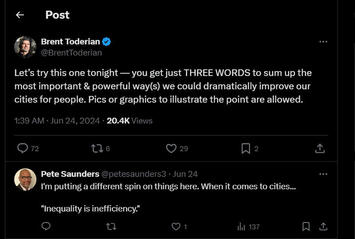
I’m an urbanist. If you’re reading this, you probably are one too. You, like me, want to make cities better places. That’s at the absolute core of being an urbanist.
How we make them better places is where differences surface. And I guess it depends on what each one of us wants from a city. If you want to eradicate homelessness or have more housing options that are affordable and offer more choices than single family homes, you’ll want dense, walkable neighborhoods. If you want to reduce auto dependence because of its impact on climate change, you’ll advocate for efficient public transit, or the spread of multimodal path systems for biking and pedestrian use.
Simple. That’s the state of urbanism now.
I follow Canadian planner and urbanist Brent Toderian on X. Toderian was at one time the chief planner for Vancouver, BC, one of the great North American cities. Toderian is a huge proponent of building up cities to promote environmental sustainability. He is also, as his consulting website says, a “passionate practitioner and advocate for creative, vibrant city-building.” Last month he started a thread with this:
“Let's try this one tonight—you get just THREE WORDS to sum up the ways we could dramatically improve cities for people. Pics or graphics to illustrate the point are allowed.”
— Brent Toderian, planner and urbanist
My take on urbanism, however, has always been a little different. If contemporary urbanists viewed cities as systems that individuals can modify to improve their quality of life, I saw them fundamentally as economic systems created by societies to generate and distribute wealth.
Considering where I grew up (Detroit), when I did (1970s and ‘80s), and how I did (in a rapidly resegregating environment that saw white residents essentially abandoning the city between 1970 and 1980, and witnessing the economic base leave with them), I saw a city that was struggling to distribute wealth. Wealth was still being generated, perhaps not like it once was. However, the distribution function was warped. I viewed cities as the greatest economic accelerator for humans, warts and all. I viewed my people, Black people, as being on the cusp of advancing our economic opportunity, and watching it slip away.
That led to my three-word entry:
“Inequality is inefficiency.”
Read the rest of this piece at The Corner Side Yard.
Pete Saunders is a writer and researcher whose work focuses on urbanism and public policy. Pete has been the editor/publisher of the Corner Side Yard, an urbanist blog, since 2012. Pete is also an urban affairs contributor to Forbes Magazine's online platform. Pete's writings have been published widely in traditional and internet media outlets, including the feature article in the December 2018 issue of Planning Magazine. Pete has more than twenty years' experience in planning, economic development, and community development, with stops in the public, private and non-profit sectors. He lives in Chicago.
Photo: screenshot from exchange between Brent Toderian and Pete Saunders on X, courtesy Pete Saunders.












